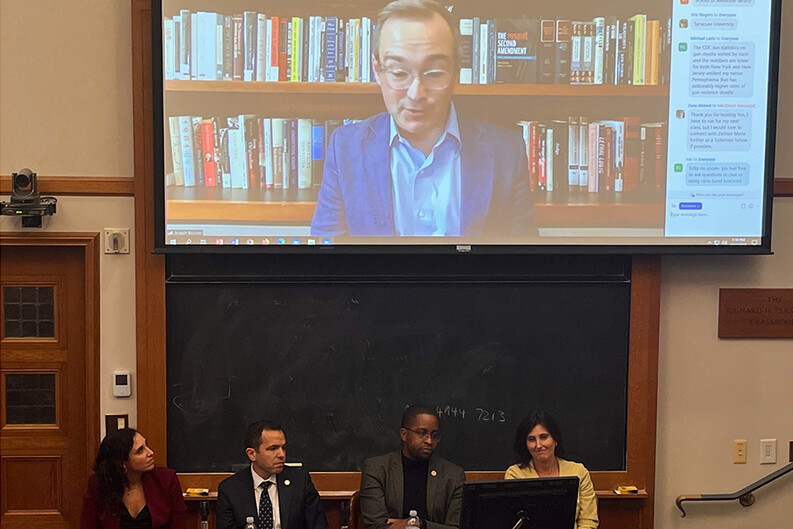Solomon Center Hosts Panel on the Future of Gun Regulation

On Oct. 2, the Solomon Center for Health Law and Policy4, in collaboration with the Yale Health Law and Policy Society (YHeLPS) and the American Constitution Society (ACS), hosted a panel discussion Unpacking Bruen: What’s Next for Regulating Guns in the Public Sphere? The panel addressed the implications of the 2020 Supreme Court decision New York State Rifle & Pistol Association Inc. v. Bruen, in which the court ruled that New York’s law requiring a license to carry concealed weapons in public places is unconstitutional. Panelists discussed the challenges of working within its confinesthose interested in addressing gun violence in the public sphere can do now.
Abbe Gluck’ 00, Alfred M. Rankin Professor of Law and Solomon Center Founding Director, moderated. The panel included New Jersey Attorney General Matthew J. Platkin, New York State Sen. Zellnor Myrie, Senior Policy Advisor for the Philadelphia District Attorney’s Office Dana Bazelon, and Duke Law School Professor Joseph Blocher.
Platkin began by outlining the steps New Jersey is taking to treat gun violence like a public health crisis through a three-pronged approach. This includes a Gun Violence Reduction Taskforce, efforts to fund and support organizations focused on violence intervention victim assistance, and the Statewide Affirmative Firearm Enforcement Office, which will work to bring affirmative litigation on gun manufacturers and distributors.
Myrie proceeded to discuss how viewing gun violence as an everyday constituent issue influenced him to identify upstream measures of accountability for gun violence. This idea spurred the public nuisance law that he wrote and passed in 2021, which has inspired several other states to pass similar legislation.
Blocher walked the audience through the substantive and methodological holdings of the Bruen decision. He reviewed the problems presented by the methodology of historical tradition, as lawyers and judges struggle with historical reasoning by analogy to issues and technology that was inconceivable at the time that the Second Amendment was passed.
Bazelon highlighted the racial disparities in gun control enforcement and discussed the steps that the Pennsylvania Attorney General’s Office is taking to mitigate automatic criminalization. She said that while guns are used as tools in the gun violence epidemic, first-time gun offenders without records do not need to be criminalized.
The panel ended with a brief Q&A session. Panelists discussed the important role of state courts and local government in addressing the gun violence epidemic, the desire to reduce criminalization while using law enforcement resources effectively to regulate gun use, and how we define sensitive places, or states are permitted to restrict guns, in areas like New York City.


